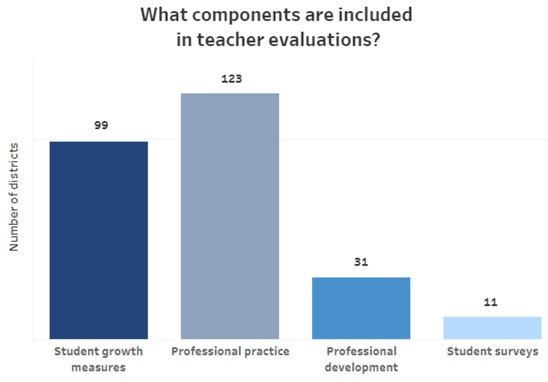5 Effective Strategies To Ace Your Teacher Evaluation: Helpful Guide
26th June 2023

In the educational system, Teachers play a vital role who not just helping students to perform academically better but also helping to shape the upcoming future as well which will also help to grow the school as well. For this, every school leader wants their teachers to perform better and one of the best ways is by using teacher’s evaluation.
According to nctq.org, there are 4 major components included in teacher evaluation. 1. Student growth measures, 2. Professional Practice, 3. Professional development and 4. Student surveys.

Source: www.nctq.org/blog/Teacher-evaluation-thats-meaningful
These evaluations are not only beneficial for teachers themselves, but also for students, parents, and administrators. Therefore, it is crucial for educators to understand the significance of these evaluations and how to prepare for them effectively.
Preparing for your teacher evaluation could be a challenging task for every educator. However, those teachers who have pursued courses like Montessori teacher training courses, not just know how to handle Montessori students but know the importance of teaching evaluation and how to prepare for it as well.
However, there’s no need to worry our blog post will also help in preparing for your teacher evaluation and ace it as well.
So, without any further delay, let’s get started.
What is Teacher Evaluation?
Teacher evaluations serve various purposes. They help administrators make informed decisions about hiring, promotion, and professional development opportunities. They also allow teachers to reflect on their teaching practices, identify areas for growth, and enhance their instructional strategies. Moreover, evaluations provide valuable feedback to teachers, helping them understand how well they are meeting the needs of their students and whether their teaching methods are effective.
What to Expect During a Teacher Evaluation?
Before diving into the preparation process, it is essential to have a clear understanding of what to expect during a teacher evaluation. Familiarize yourself with the evaluation criteria, which may include classroom management, instructional delivery, assessment strategies, and student engagement. Understand the specific evaluation model or framework being used and gather information about the process, such as the duration of the evaluation and the roles of the evaluator and the teacher.
Now, let’s get to know some of the five best ways of preparing for your teacher evaluation.
5 Best Ways to Ace Your Teacher Evaluation
1. Preparing Your Teaching Portfolio
A teaching portfolio is a valuable tool that showcases your teaching philosophy, professional achievements, and evidence of your teaching effectiveness. Start by organizing your portfolio in a clear and logical manner, including sections such as a professional statement, lesson plans, student work samples, and professional development records. Ensure that your portfolio reflects your teaching strengths and aligns with the evaluation criteria. Regularly update your portfolio with new evidence of your growth and accomplishments.
2. Gathering Evidence of Your Teaching Effectiveness
To prepare for a teacher evaluation, it is crucial to gather evidence that demonstrates your teaching effectiveness. This evidence can include student work samples, lesson plans, assessments, and reflections. Collect artifacts that showcase your ability to differentiate instruction, create a positive learning environment, and engage students in meaningful learning experiences. Be selective in choosing evidence that is relevant to the evaluation criteria and highlights your strengths as an educator.
3. Practicing for Your Teacher Evaluation
Just like any other skill, practicing for your teacher evaluation can significantly enhance your performance. Collaborate with colleagues or mentors to create mock evaluation scenarios and simulate the evaluation process. Practice delivering lessons, responding to hypothetical questions, and receiving feedback. This will help you become more comfortable and confident during the actual evaluation. Reflect on these practice sessions and make adjustments to improve your teaching strategies and address any areas of weakness.
4. Reflecting on Your Evaluation and Seeking Feedback
After the evaluation, take the time to reflect on your performance. Consider what went well and areas that may need improvement. Reflecting on your evaluation allows you to learn from the experience and make necessary adjustments to your teaching practices. Additionally, seek feedback from your evaluator or colleagues. Their insights can provide valuable perspectives and help you further refine your teaching skills.
5. Continuing Professional Development After the Evaluation
A teacher evaluation should not mark the end of your professional growth. Use the feedback received during the evaluation to identify areas for improvement and set professional development goals. Take advantage of professional development opportunities, such as workshops, conferences, and online courses, to enhance your teaching skills and stay updated with the latest educational trends. Engage in reflective practices, collaborate with colleagues, and seek out opportunities for ongoing growth and improvement.
Tips for Managing Nerves During the Evaluation
Teacher evaluations can be nerve-wracking experiences, but there are strategies to help manage anxiety and perform at your best:
1. Prepare thoroughly
The more prepared you are, the more confident you will feel. Review the evaluation criteria, practice your lessons, and gather evidence of your teaching effectiveness.
2. Stay organized
Keep all necessary materials and documents organized, including your teaching portfolio, lesson plans, and student work samples. Being organized will help you feel more in control during the evaluation.
3. Take deep breaths
Deep breathing exercises can help calm your nerves. Take a few deep breaths before and during the evaluation to help relax your body and mind.
4. Focus on the students
Remember that the evaluation is ultimately about the students' learning experience. Stay focused on their needs and engage them in meaningful learning activities.
5. Embrace feedback
View the evaluation as an opportunity for growth and improvement. Be open to feedback and use it constructively to enhance your teaching practices.
Early Preparation For a Teacher’s Evaluation is Beneficial
Preparing for your teacher evaluation early is a critical and beneficial step toward professional growth and development and those educators who have pursued courses like Montessori teacher training courses know it really well. By understanding the importance of evaluations, organizing your teaching portfolio, gathering evidence of your teaching effectiveness, practicing for the evaluation, reflecting on your performance, and continuing professional development, you can ensure a successful evaluation experience.
Lastly, remember to manage your nerves and view feedback as a valuable tool for improvement. With thorough preparation and a growth mindset, you can confidently navigate the teacher evaluation process and excel in your profession.
Find the right course for you and try out the course. Call us at 1800–212–6400. You can also mail us at act@asiancollegeofteachers.com.












